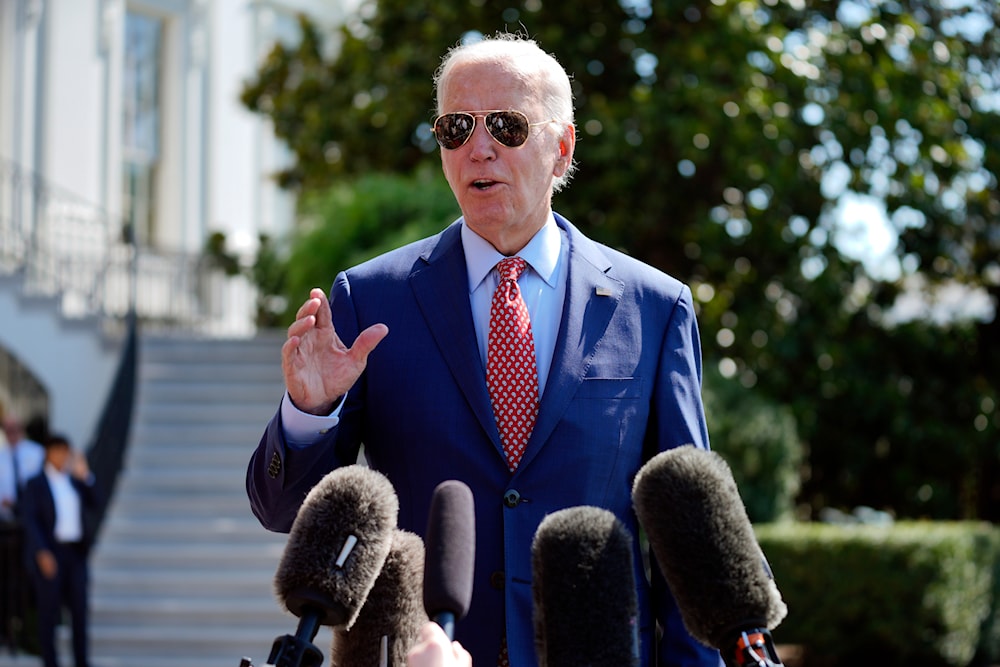Biden warned Netanyahu against counting on US if PM escalates: Axios
US President Joe Biden is asking his ally Benjamin Netanyahu to ease regional tensions as he continues to back his endeavors.
-

US President Joe Biden speaks to reporters before boarding Marine One on the South Lawn of the White House, Friday, August 2, 2024, in Washington, en route to Wilmington, Delaware (AP)
US President Joe Biden made a firm phone call urging Israeli Prime Minister Benjamin Netanyahu to halt escalating tensions in the region and prioritize a ceasefire and prisoner swap deal with Hamas, Axios reported Friday, citing sources familiar with the matter.
This urgent communication follows Biden's alleged frustration with the Israeli occupation's recent assassinations in Beirut and Tehran, actions taken shortly after Netanyahu's first visit to the White House in four years. His administration is particularly concerned about the fallout from the assassinations of senior Hezbollah commander Fouad Shokor and Hamas political bureau chief Ismail Haniyeh.
Though Biden was not stuck on Shokor's assassination, US officials felt blindsided as they were not informed of any such actions ahead of time, especially after Netanyahu gave them the impression that was committed to negotiating a deal with the Palestinian Resistance.
This is particularly frustrating for Biden because he had been pushing for a ceasefire and prisoner swap deal. But his ally seems to have had other plans that further inflamed the situation.
During the call, Biden discussed joint US-Israeli military preparations in anticipation of retaliations from Iran and Hezbollah but also expressed his displeasure with Netanyahu's recent decisions.
US stance with 'Israel' "limited"
Biden emphasized that while the US would support the Israeli occupation against any Iranian act of retaliation, he expects the former to refrain from further escalation and move forward with the prisoner swap immediately.
Netanyahu's office responded, expressing appreciation for American support and reiterating that his actions were guided by the "security needs" of the occupying entity. However, Biden warned Netanyahu against counting on US intervention should he choose to escalate the situation further.
Axios also reported that Biden had expressed his urgency for a Gaza deal during a meeting with Netanyahu, raising his voice and stressing the importance of reaching an agreement within one to two weeks. Biden underscored this point during a subsequent meeting with families of American captives in Gaza.
In a subsequent statement to reporters, Biden confirmed the direct nature of his conversation with Netanyahu and reiterated the potential for a ceasefire. He acknowledged that the assassination of Haniyeh had complicated these efforts but maintained that a deal was still possible.
Netanyahu not interested in US proposal
Biden put forward a ceasefire proposal in May that included a three-phase execution plan. The US National Security Advisor stated then that Biden's proposal was in fact an Israeli one.
However, after Hamas said it "views positively" the terms of the agreement, Netanyahu announced opposition to "Israel's" own deal, saying that the war on Gaza would not end until "all objectives are achieved" and rejecting to make any kind of commitment that the aggression would stop, neither orally nor written.
"[Israeli Prime Minister Benjamin] Netanyahu wants a deal that is impossible to get. At the moment, he isn't willing to move and therefore we might be headed for a crisis in the negotiations rather than a deal," an Israeli official pointed out.
Moreover, it was reported that the Israeli occupation presented Saturday an updated plan to the United States regarding the Gaza captives and ceasefire negotiations.
The negotiations surrounding the ceasefire agreement are at a pivotal stage, Axios columnist Barak Ravid underlined as he cited US President Joe Biden stressing the importance of retaking the captives and reaching a ceasefire agreement two day prior.
Israeli occupation Prime Minister Benjamin Netanyahu has been in pursuit of an agreement, too, though a different kind of agreement; one that would allow the Israeli occupation to carry on with its onslaught on Gaza while further stifling the Palestinians in Gaza by allowing "Israel to control the Gaza-Egypt border.
The proposal also outlines changes in the redeployment locations for Israeli occupation forces in Gaza during the initial phase of the deal, with IOF soldiers remaining in the Philadelphi corridor along the Gaza-Egypt border during this phase.

 4 Min Read
4 Min Read








